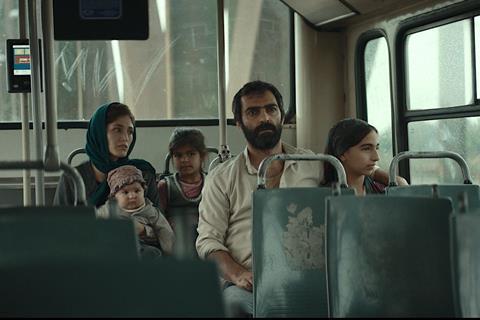Vuk Rsumovic follows up Venice Critics Week winner ’No One’s Child’ with this sober Serbia-set refugee drama

Dir: Vuk Rsumovic. Serbia/Italy/Croatia. 2024. 100mins.
Stark figures at the end of Dwelling Among The Gods note that more than 50,000 people have died trying to reach Europe in the past three decades – of those, almost 90% were buried as John or Jane Doe. Director Vuk Rsumovic (writing with Momir Turudic) shows us the bureaucratic nightmare families face trying to identify a loved one. That’s the case for Fereshteh (Fereshteh Hosseini) newly arrived in Belgrade, Serbia, after fleeing Afghanistan with her husband Reza (Reza Akhlaghirad) and their three young daughters, when she discovers her brother Ali, who came some weeks before them, may have drowned.
Fereshteh Hosseini’s generally under-stated performance anchors the drama
Rsumovic crafts his heartfelt film around Fereshteh’s attempts to confirm the identity of the body and claim it, although the drama is sometimes hampered by the sedate pacing. Along the way, he explores the rights of refugees and Fereshteh’s attempts to make her voice heard after a lifetime of staying silent. The director’s first film since 2014’s No One’s Child won four awards at Venice Critics’ Week might not be breaking new ground but further festival play and a potential streaming platform outlet seem likely following a premiere in Sarajevo competition.
Right from the start, Rsumovic brings home the high level of emotional stress suffered by those seeking refugee status, as Fereshteh tries to find out what has happened to her brother – one person in a crowd of others with questions. With language a barrier, she is quickly reliant on translator Nikola (Nikola Ristanovski) to help. Told that she must get a DNA sample from her father to prove Ali’s identity – why her own DNA would not suffice is never touched upon – we watch as the bureaucratic process slowly turns. Against a backdrop of an increasingly nationalistic Europe closing its borders the family are desperate to move on, but Fereshteh becomes determined to claim the body she is convinced is Ali’s.
Her personal shift proves much more engaging than the bureaucratic battle, not least because of a scripting decision to include several scenes in which Nikola translates. Rsumovic and cinematographer Damjan Radovanovic choose framing that keeps things visually interesting – such as using a reflection in a waiting room scene to ensure Fereshteh remains the focal point – but Nikola’s translation is above board, and his faithfulness to Fereshteh’s meaning leads to dialogue repetition that makes these scenes sluggish and over-long.
The action has more spring in its step when it watches how Fereshteh handles the expectations of her father and husband, and the arrival in Belgrade of her mother-in-law and father-in-law. It’s also a credit to Rsumovic and Turudic that, whatever the broader picture, Reza is not just a one-note reflection of the patriarchy. Scenes in which Fereshteh’s eldest daughter Azadeh (Melissa Maroofi) begins to challenge her mother’s authority also show cultural expectations around the way women should behave are enforced as much by maternal conditioning as paternal insistence. It’s a tantalising element of the film that could benefit from more exploration.
Throughout, the lyrical and plangent score from Alessandro Ciani enhances the sombre mood. Meanwhile Hosseini’s generally under-stated performance, punctuated by moments of explosive emotion, anchors the drama, as the outcome becomes as much about her own sense of identity as that of her brother.
Production companies: BaBoon Production
International sales: BaBoon Production, vuk@baboonproduction.com
Producers: Mirko Bojovic, Ines Vasiljevic, Ankica Juric-Tilic, Miroslav Mogorovic
Screenplay: Momir Turudic, Vuk Rsumovic
Cinematography: Damjan Radovanovic
Production design: Jovana Cvetkovic, Jelena Sopic
Editing: Aleksandar Stanojevic
Music: Alessandro Ciani
Main cast: Fereshteh Hosseini, Nikola Ristanovski, Reza Akhlaghirad, Vule Markovic















![[L-R]: Amanda Villavieja, Laia Casanovas, Yasmina Praderas](https://d1nslcd7m2225b.cloudfront.net/Pictures/274x183/6/4/1/1471641_pxl_20251224_103354743_618426_crop.jpg)








